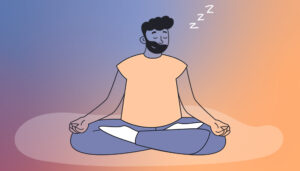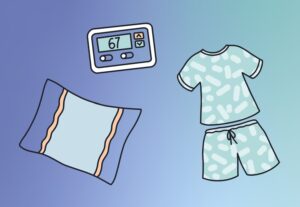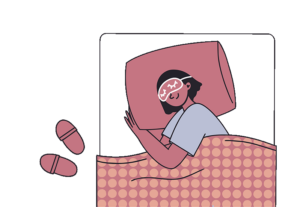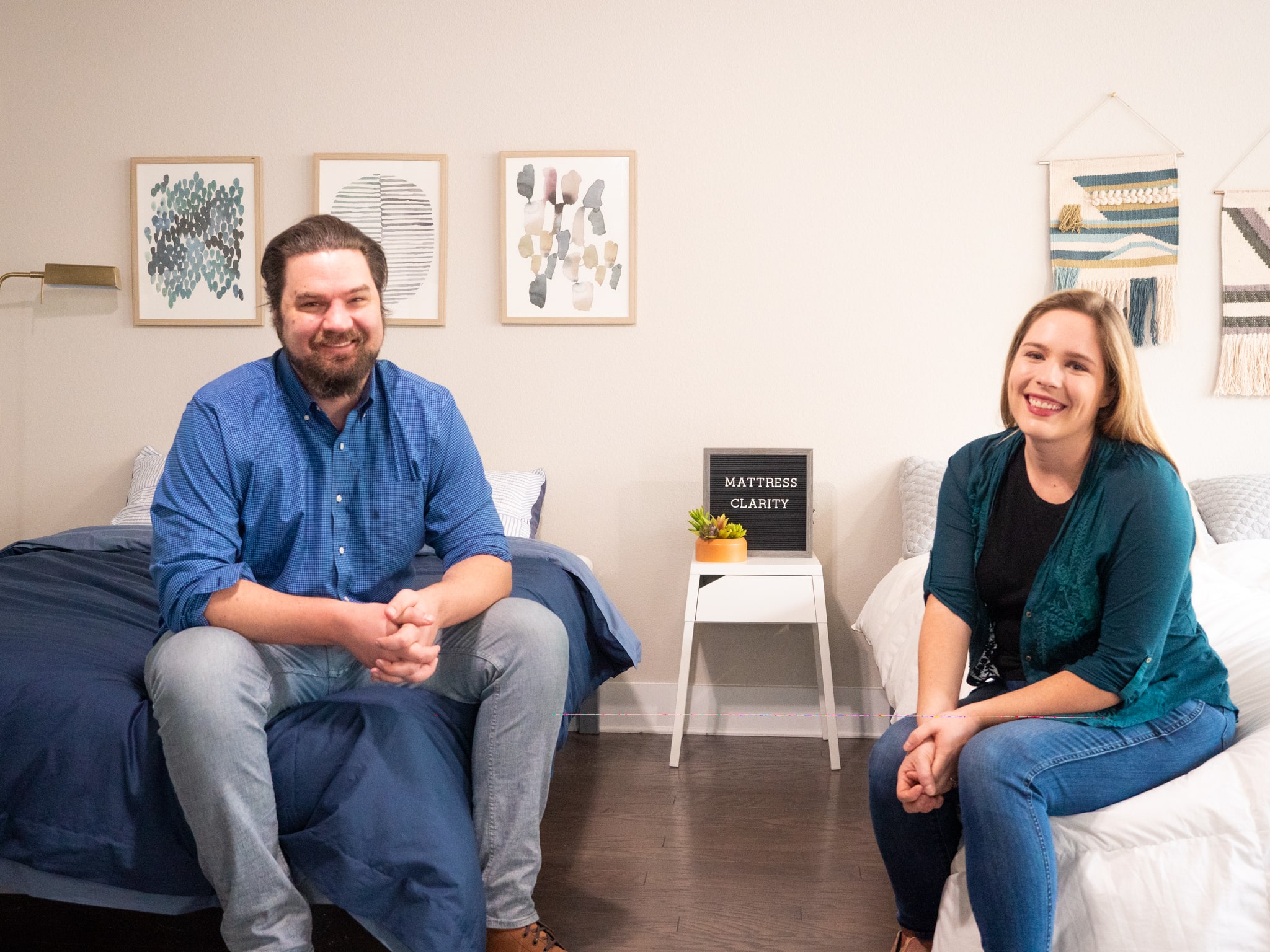If you’ve ever been unable to get proper rest, you know it can be hugely detrimental to your physical and mental health. Whether it’s racing thoughts keeping you awake, or the symptoms of a health condition, you’ll want to find a sleep solution that works for you.
We’re here to help! Check out our latest insights below on what to do if you can’t sleep.
What to Do If You Can’t Sleep
While you can change some lifestyle habits, you may still experience difficulty falling or staying asleep even when tired.
Here are some other effective methods that can help combat sleeplessness.
Create a Relaxing Environment
Sometimes, all it takes to have a great night’s rest is to create an optimal sleep environment. Wonder why spas use dim lighting and soft soothing music? Those elements help guests feel peaceful and rested, leaving their appointments with lowered cortisol levels and heightened oxytocin and serotonin levels.
Bring the spa home with these tips below.
Set the Thermostat
Being too hot or too cold quickly distracts the mind when trying to sleep. According to Dr. Rachel Salas, MD, a neurologist at Johns Hopkins University, the ideal temperature to sleep in is between 65 and 69 degrees Fahrenheit.
To help keep your bedroom temperature consistent, try keeping your blinds closed during the day (especially in the summer) or having a ceiling fan on low or medium to better circulate the air. Remember, the more measures taken to keep the thermostat consistent, the less work your body has to do to regulate your temperature at night!
Invest in Comfortable Sleepwear
For those who don’t prefer sleeping naked, there are loungewear and sleepwear solutions for all ages, budgets, and style preferences.
When finding the right sleepwear, it’s important to consider the fabric’s fit, feel, and breathability. If your clothing is too loose or tight, your body’s movement is restricted. When the fabric is too rough or scratchy, you won’t feel comfortable in any position. By wearing clothes that are too thick in material, your body might overheat.
RELATED: Cozy Earth Pajamas Review – The Softest PJs Ever?
Play Soothing Music or Listen to a Calming Meditation
From Beethoven to white noise, there’s something out there for everyone. However, when listening to music at bedtime, a 2019 study found that audio recorded at 432Hz offers significantly calming effects.
If you’re not one for listening to music at night, but prefer other audio outputs, try a calming meditation, audio ASMR, or guided breathing session. With playlists available on YouTube, Spotify, and curated sleep apps at the tips of your fingers, test out which one works best for you!
Try an Eye Mask
Whether city lights peek through your window or your roommate won’t turn off the light you may benefit from a sleep mask. By eliminating distracting light, your mind has one less distraction while trying to sleep.
As consumers turn to eye masks for additional uses like travel, headache or migraine management, or cosmetic reasons, there are a plethora of options to choose from.Check out our review of the best sleep masks on the market!
Experiment with Aromatherapy
While some consider aromatherapy for sleep an expensive gimmick, several studies confirm its physiological effect, connecting certain fragrances to rest and relaxation. The most effective scents for sleep include:
- Cedarwood
- Lavender
- Roman Chamomile and
- Vanilla
Pair aromatherapy with a diffuser or humidifier and see which blend relaxes you the most! However, be sure to follow the guidelines on essential oil products and confirm your humidifier is compatible with aromatherapy.
Limit Blue Light Usage
Artificial light is a major disruptor to your sleep – especially blue light. After turning off the lights at bedtime, do you reach for your phone for a bit of nighttime scrolling? By looking at your screen, the blue light offsets your natural melatonin levels and confuses your circadian rhythms.
While it may be hard to break the habit at first, work towards a goal of limiting screen time up to three hours before bedtime to allow your body enough time to naturally grow tired and help you fall asleep. You’ll also want to put your devices on silent so social media pings don’t keep you up at night.
Take a Warm Bath or Shower
Did you know that taking a warm bath or shower 90 minutes before bed could boost your sleep quality? From balancing your body temperature to relaxing tense muscles, there are several benefits to rinsing off or taking a nice long soak before bed.
Want to bring an evening bath to the next level? Pair it with some aromatherapy, bath salts, and soft soothing music to boost your serotonin levels.
Exercise, Stretch, or Practice Yoga
It’s hard to relax with tight or tense muscles. For those who end the day with pent up energy or stress, moderate exercise up to thirty minutes before bed can help lower cortisol levels and get you ready to rest.
Want to rid your body of excess energy without working up too much of a sweat? Yoga and stretching are effective exercise methods that lower your heart rate, relax your body, and naturally help you prepare for bed.
Try a New Comfortable Mattress or Mattress Topper
Whether you’re tired or not, it can be a challenge to fall asleep on a lumpy, uncomfortable mattress. If your body isn’t supported correctly, expect to toss and turn throughout the night.
If you’re finding an uncomfortable bed is keeping you up at night, you may want to check out our latest review of the most comfortable mattresses. Want that cozy feeling but can’t invest in a new bed just yet? We also created a list of the best mattress toppers that will help you feel more comfortable at night.
Listen to Your Body
Ultimately, your body will tell you when it’s ready for rest. Forcing yourself to sleep when you’re not tired could be counterintuitive.
Instead, get out of bed and try something else for thirty minutes (read a book, wash the dishes, or play with your pet) until you get tired. By waiting, you can train your brain to recognize the bedroom as a place of rest instead of another multipurpose room.
Why Can’t I Sleep At Night Even When I’m Tired?
Certain life stages (students, expectant mothers, new parents, and night shift workers) are often accompanied by altered sleep schedules. However, for others who regularly experience sleeplessness even when tired, there are three main factors to consider: mental health, physical health, and nutrition.
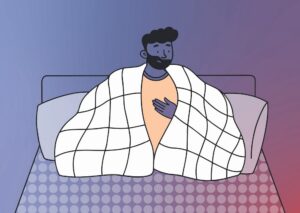 Mental Health
Mental Health
Mental health and sleep are closely correlated. Mental health disorders and conditions, including anxiety, depression, loneliness, PTSD, OCD, schizophrenia, and ADHD can all have a detrimental effect on sleep. In addition, ongoing stressful situations such as financial worries or job uncertainty could equally disrupt your sleep.
Seek council or therapy with a licensed professional to learn how to manage your mental health and sleep. Booking an in-person or virtual session with a psychologist could help you work through any mental hurdles or stressors stunting your sleep quality. If you need a more targeted treatment for diagnosed mental health or sleep disorders, a psychiatrist can provide talk sessions and prescriptions.
Physical Health
Consistently getting poor sleep negatively affects your physical health. And vice versa, your physical health plays a role in how well you sleep.
Below are some of the ways physical health can impact your sleep:
- Age: While aging might not always be the reason for a disrupted sleep schedule, there is a significant shift in sleep for seniors. These changes could stem from evolving circadian rhythms, an influx in medications, and/or the onset of certain sleep disorders including sleep apnea and Restless Leg Syndrome (RLS).
- Hormones: Certain life stages such a puberty and menopause can negatively impact sleep as hormone levels fluctuate and stabilize.
- Pain: Whether it’s arthritis, your neck, back, or hips, both acute and chronic pain make it hard to comfortably fall and stay asleep.
- Medication: It’s common for many over the counter and prescription medications to cause some side effects. Check your medications to see if your prescriptions can cause insomnia, trouble sleeping, or racing thoughts. If so, you might be able to switch to an alternative with your doctor’s approval.
If you suspect your physical health is impacting your sleep, schedule a consultation with your primary care provider to see what next steps are best for you.
Nutrition
Food is the body’s source of energy, so it makes sense that there are direct correlations between nutrition and sleep. Following a healthy diet helps promote sustained energy levels, brain functionality, muscle growth, intestinal health, and better sleep quality.
While it’s okay to enjoy sweet and savory treats, over-indulging in caffeine, alcohol, sweetened drinks, and sugary foods could inhibit your sleep. To start, try limiting or avoiding these foods and fast at least three hours before bed to allow for proper digestion and regulation.
FAQs
Why can’t I sleep when I’m alone?
Being alone at night can stir up several different emotions —feelings of loneliness, anxiety, grief, and more. To combat this, try sleeping with a weighted blanket, finding a new hobby during the day, or increasing your daily social interactions.
Why can’t I sleep while pregnant?
Your body undergoes many changes throughout pregnancy. Depending on what trimester you are in, common sleep disruptors include morning sickness, frequent urination, heartburn, leg cramps, back and hip pain, and pregnancy insomnia. Check out our guide on how to get the best sleep during (and after) pregnancy!
Why can’t I sleep when I’m sick?
Your body goes into overdrive when feeling under the weather, fighting off bacterial or viral infections. Especially if you have a fever, sinus pressure, or respiratory symptoms, it can be hard to get the rest your body needs to recover quickly. Check out our guide on how to sleep when you’re sick to see which remedies could help you!
Can counting sheep help you fall asleep?
Many sleep researchers do not think that counting sheep helps people fall asleep, but there is no specific research to back this up. A 2002 study found that imagery may help people fall asleep, though.

